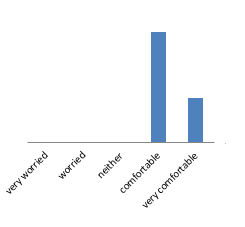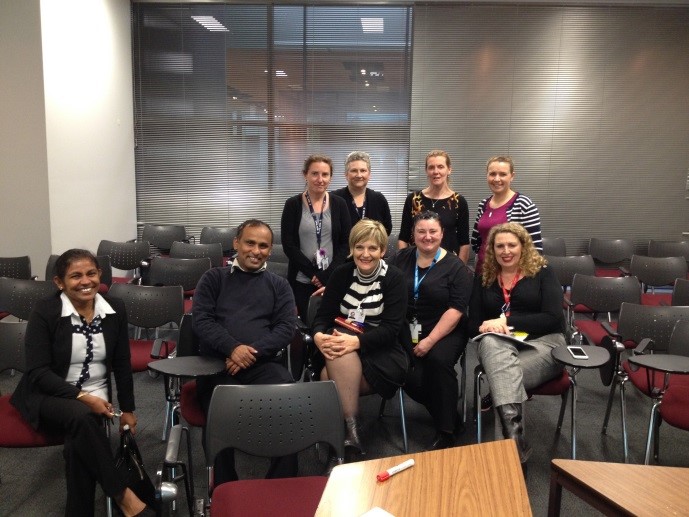JANE PORTNOY
Jane Portnoy is a Social Worker at the Ronald Sawers Haemophilia Centre at The Alfred, in Melbourne Australia.
Visiting a major public hospital like the Alfred may not have been the first thing in your mind about things to do in your life, but if you are a young man or woman with a bleeding disorder it is likely that you will have to include an adult hospital like this in your list of places that you have to go.
Growing up involves many steps. Some of these steps are clear and simple. Young people know that they will progress through school, graduate and move into trades, university or employment. They know that they will be able to make choices for themselves. Many are able to take on the responsibilities as required.
However, not everyone is ready at the same time, and there are lots of reasons why some people may not be so enthusiastic in their progression to a new stage. We know that having a chronic illness such as haemophilia certainly adds complexity and increases the risk of difficulties. Of course we also recognize that shifting medical care at this time can add to this burden. While there are many reasons that our systems are structured in this way, it also demands that we have to support this process with robust transition practices. These young people at this developmental stage and in this transition process are at a greater risk of neglecting their health care, and consequently having negative health outcomes. This is demonstrated in research and is seen in our everyday practice. These consequences can be far reaching.
Of course we all handle change in our own way. Some people see it as welcome and exciting. For others it’s uncomfortable. Sometimes change comes with challenges that are predictable, other times they are unexpected.
Becoming an adult is an exciting time. There is more freedom and fun however there are also some new responsibilities.
There are new skills to learn and things to work through. These include dealing with driving, bills, finances, accommodation, work, university, voting, and also managing your health. This shift of responsibility from parents to a young person is part of their journey to independence.
Parents can find these changes really tough too. They have to make all these adjustments with their child, and they also have to start getting used to letting their child take on some of these responsibilities.
Changing your Haemophilia Treatment Centre brings its own concerns. There are new staff to rely on including doctors, nurses, social workers, psychologists, and physiotherapists. Young people may even have to go to a new hospital. On the positive side there are new opportunities for help.
So how can we try and make this an easier process? The Haemophilia Treatment Centre team think we are tuned-in to our patients’ needs. But how can we really be? There are many variables – everyone has a unique personality and experiences and it takes us a while to get to know our new patients and their family or support crew. We will need patients and families to let us know what they need, and to give us a chance to get to know them. We do our best work when we understand who a person is, what is important to them and all about their medical issues.
One of my jobs as a Social Worker in our team is to help our young patients to transition their health care to The Alfred. I regard this as one of the most important parts of my job. It can have a huge impact on the relationship that the young people and their family make with us.
At this stage of life the adolescent brain (15-25 year olds) is at its peak for learning, but still under construction for some of the other functions such as impulse control, and decision making. As part of taking on responsibility, people often make mistakes. It is often through making mistakes that learning and creativity is able to blossom. Hence it is a time for us to seize the opportunity, and support our young men and women, but also provide a safety net and supports to enable them to take on responsibility. It is also essential for growing up, that young people realise that they are accountable and that they do have to own their actions.
We encourage all people transiting to The Alfred to be involved with Haemophilia Foundations. There are a number of ways that this can happen, attending the camps or other events. These occasions have been carefully planned with the involvement of this centre and the Haemophilia Foundations. We see the benefits of attending these events over and over again.
Here are a few definitions that I have found useful:
"Purposeful, planned movement of adolescents and young adults with chronic physical and medical conditions from child-centred to adult-oriented health care systems.”1
“In the context of haemophilia, transition also refers to the continual process of learning about haemophilia and how to manage the many aspects of care. Transition is more complex for families living with haemophilia. Each stage of development involves extra learning for the parents and the child, and the comprehensive care team as well.”7
“A multi-faceted, active process that attends to the medical, psychosocial, and educational/vocational needs of adolescents as they move from child to adult centred care.”6
In September 2016, we invited all the future patients of the Ronald Sawers Haemophilia Centre and their families to come along to a weekday evening to meet the team. There were about 14 patients invited.
Our goals were to:

We started with a tour of some parts of the hospital that patients are likely to visit when they come in with a bleed or for a clinic visit.
After this we introduced our team and there was an opportunity to ask questions. There were great questions: How appointments work? Why we have certain people in the team? A few attendees commented that they had learnt something new about their condition.
Haemophilia Foundation Victoria supplied supper, and after the formalities were finished we had pizza, sushi, drinks and an opportunity to talk together. In this more informal setup we provided the chance to open up discussion and an opportunity for patients and their families and the professionals to get to know each other.
The team at The Alfred really enjoyed meeting future patients and families and finding all about the interesting things that make them who they are including what their plans are for the future. We don’t often get the opportunity to meet on an informal basis outside of the clinic.
We felt that our pre-transition evening was successful and we asked participants for feedback at the end of the evening. Everyone who responded found the session reduced their anxiety about transition. We asked participants to complete a one page survey, to examine how we were meeting the goals that we had set. Our team feel it critical to future planning and in planning a broader transition program. Analysis of our service gives us information. Much research has been undertaken into the impact of poor transition. The consequences are significant and costly for consumers, their families, and for health service providers. The costs include, but are not limited to, quality of life, engagement, satisfaction, pain, and monetary costs.
Prior to this session how did you feel about changing to the Ronald Sawers Haemophilia Centre?

After tonight how do you feel about changing to the Ronald Sawers Haemophilia Centre?



Many other patients were not able to join us, but we have been able to use this opportunity to contact them, and start the process of introducing our service and getting to know the patients.
The two teams from The Royal Children’s Hospital and The Alfred had a formal clinical handover meeting. We used the ABDR to look at a summary of each person’s medical information.
In December and February we will hold transition clinics to formally meet and review all our new patients. At these clinics we look forward to meeting our new patients. We are hoping to continue getting to know these young men and women and their families. In this way we are aiming to maximise their good health. We are also keen to reduce the negative impact of poor transition. We know that young people are generally motivated and it is important to harness this eagerness to improve their health. Usually engagement with a Haemophilia Treatment Centre is both an indication of and a pathway towards best possible health.


The HTC teams from the Alfred and the Royal Children’s hospital, and visiting doctors from Sri Lanka at the clinical meeting in October 2016
Photo: Jane Portnoy
1.Blum RWM. Chronic illness and disability in adolescence. Journal of Adolescent Health 1992;13:364-368.
2. Bolton-Maggs PHB. Transition of care from paediatric to adult services in haematology. Archives of Disease in Childhood 2007;92:797–801. doi: 10.1136/adc.2006.103804
8. Viner R. Barriers and good practice in transition from paediatric to adult care. Journal of the Royal Society of Medicine 2001;94(Suppl. 40):2–4
Haemophilia Foundation Australia acknowledges the Traditional Owners and Custodians of Country throughout Australia, the land, waters and community where we walk, live, meet and work. We pay our respects to Elders past and present and extend that respect to all Aboriginal and Torres Strait Islander peoples.
Sign up for the latest news, events and our free National Haemophilia magazine